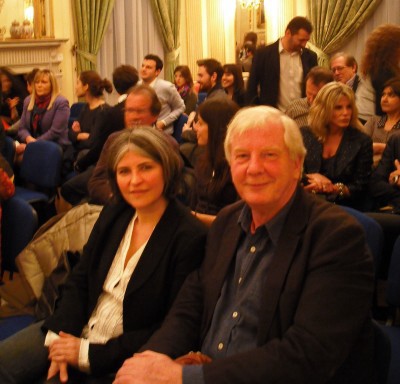On Translating Andrés Neuman's "Traveler of the Century"
by Alicia Kennedy

Andrés Neuman, born in 1977, is young, prolific and ridiculously talented. He published his first novel, Bariloche, at 22 and has since published nine more books, including novels, books of poetry, aphorisms and a travel book. He was named to the Bogota 39, a list of 39 Latin American writers under 40 to watch, and was included in Granta’s The Best of Young Spanish-Language Novelists. Until now, none of his books have appeared in English. That’s changing with the prize-winning Traveler of the Century, out next week from Farrar, Straus & Giroux. It’s a roving, weird tale of a traveler and translator who ends up in the ever-changing town of Wandernburg, Germany in the 19th century. The two translators who took on the novel are Nick Caistor and Lorenza Garcia — and I interviewed them by email about what it’s like to translate as a duo.
How did you get started translating?
Garcia: I found a book I thought might be of interest to readers in English — the memoirs of Luis Buñuel’s widow ghostwritten in Spanish, and I suggested it to a publisher, who was impressed by my writing and passed my name on to other publishers. I ended up translating French thrillers — a long way from the book I originally proposed.
Caistor: I lived in Argentina for several years, and when I came back to Britain was offered Latin American translations as part of the boom in translated literature from there, and then things just took off from there….
What drew you to the project of translating Traveler of the Century?
Garcia and Caistor: We read it, and loved the way he brought his characters alive in a historical setting, which at the same time felt very modern.
The dialogue is written without the use of quotation marks so that everyone’s speech becomes embedded in the narration, and with the selective use of parentheticals to mark off different speakers. Was this difficult to work with, considering the numerous distinct voices talking on lofty topics?
Garcia and Caistor: As translators we read the text very closely, and Andres’s intention of mingling voices as opposed to writing linear dialogue was very clear to us. Although the publishers found it rather harder, we think, to adapt their conventions.
Did any other aspect of the book present special difficulties?
Garcia and Caistor: The novel has been translated into several languages, and when discussing certain aspects of it with the author, he emphasized the need to avoid “over-explaining” the metaphors that were meant to be surprising, for example at the beginning he wanted us to keep “the horse blew clouds from its nostrils” as opposed to, for example, “clouds of vapour.”
Similarly, Andres insisted that the love-making scenes should not be prettified in any way, as he wanted to underline the difference between his approach and the traditional romantic nineteenth-century novelistic tradition.
The protagonist, Hans, is a translator, though perhaps a shifty one who’s not exactly fluent in all the languages he works in, and he gets his lover, Sophie, to work with him. Did you recognize any of yourselves in this depiction? (Apart from the book’s rather explicit sexual aspects, of course!)
Caistor: What I particularly liked was the insistence in the novel on the way that European culture was interconnected so that for example there are translations of Portuguese, Italian, French, German, Russian, English and Spanish poems, which create a feeling of the possibilities of communication and understanding across frontiers. And that’s what we’re trying to do in our own small way as translators.
Garcia: It was clear to me from reading Hans’ comments about the nuances of translation, of remaining faithful to the original work while creating a new version that reads fluently in one’s own language, that as someone who has himself translated, Andres understands these processes perfectly. It felt like we were in good company.
What is the process like, working with another translator versus working solo?
Garcia and Caistor: Translation is always a hit and miss process, and the more you can share ideas and doubts with someone else, the more fruitful that process becomes. Of course it helps when you are on the same wavelength, as we seem to be.
In only the context of Spanish-language lit, what do you think of the book-jacket-ready line of Roberto Bolaño’s, “The literature of the twenty-first century will belong to Neuman”?
Caistor: Well, Bolaño was always very generous with younger writers, but I think what he was doing, and what he admired in others, were efforts to renew literature in Spanish after the generation of people like Borges, Garcia Marquez, Vargas Llosa etc. Bolaño, I think, appreciated Andres’ attempts at creating a hybrid kind of fiction and a fresh approach.
Previously: Translating A Norwegian First Novel: A Q. & A. With Kerri Pierce
Alicia Kennedy is a copy editor, yogi and amateur baker. She is maybe not as boring as that makes her sound.
